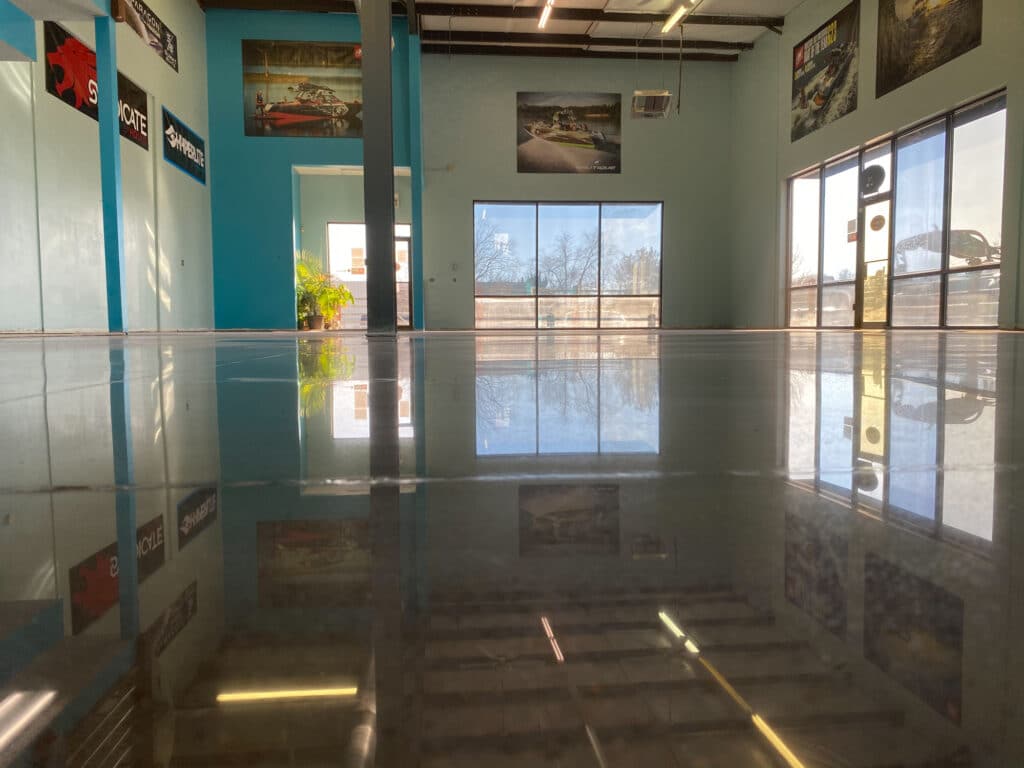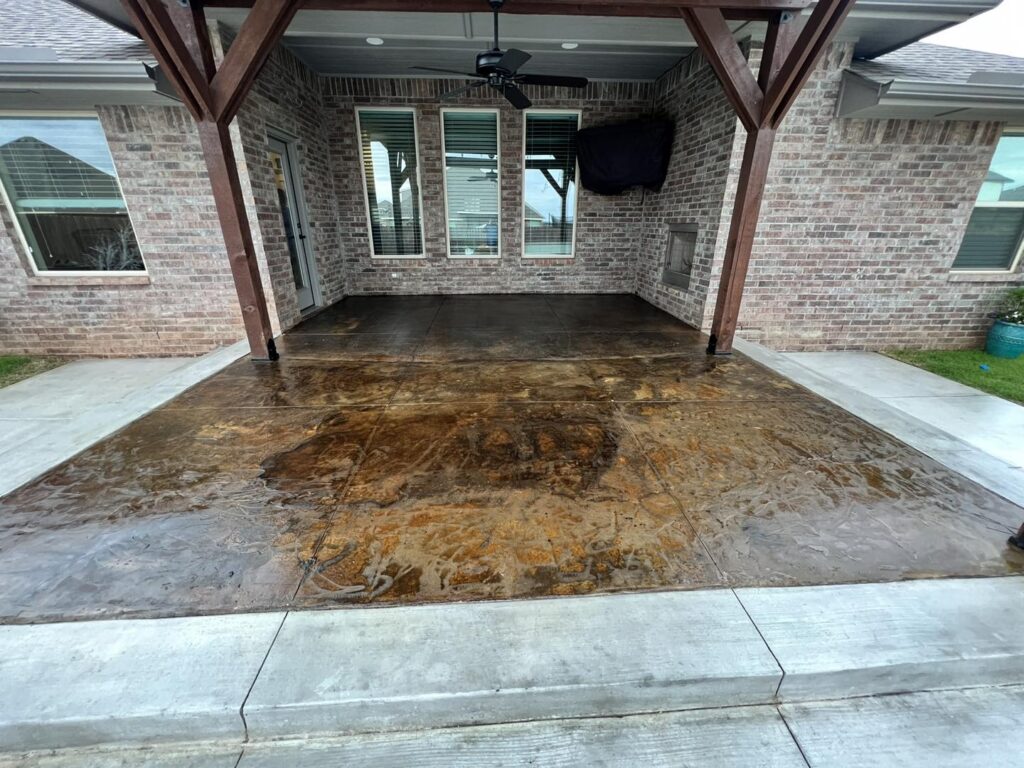Epoxy Floor Installation in Commercial Settings: What to Consider
Epoxy floor installation has gained immense popularity in the commercial setting due to its unparalleled durability, low maintenance, and aesthetic appeal. Businesses today are looking for cost-effective flooring solutions that can withstand the heavy traffic and wear and tear of commercial spaces. Epoxy floor installation is a smart investment that not only adds value and longevity to your flooring but also enhances your brand image. However, deciding on the right epoxy floor installation can be overwhelming. With so many options available, it’s essential to consider factors like the type of business, the level of traffic, and the type of environment to ensure you make the right decision. In this blog, we’ll look at what you need to consider when choosing an epoxy floor installation for your commercial space and why it’s crucial for your business’s success. So, let’s dive in and explore everything you need to know about epoxy floor installation in the commercial setting.
Understanding Epoxy Flooring Installation
Epoxy flooring has rapidly gained popularity in recent years, and for good reason. This type of flooring is made by mixing two components – a resin and a hardener – to create a strong, durable, and chemically resistant surface. Epoxy flooring is commonly used in commercial and industrial spaces, such as warehouses, hospitals, and factories, but it has also become a popular choice for residential properties.
When it comes to installing epoxy flooring, there are several steps involved. The first step is to prepare the surface by cleaning and grinding it to remove any previous coatings or stains. Once the surface is clean and smooth, a primer is applied to ensure the epoxy adheres properly. Next, the epoxy mixture is poured onto the surface and spread using a roller or squeegee. Depending on the desired finish, multiple coats may be necessary. Finally, a topcoat is applied to provide additional protection and durability.
One of the biggest advantages of epoxy flooring is its durability. It is resistant to chemicals, stains, and abrasions, making it ideal for high traffic areas. It is also easy to clean and maintain, and can even be customized with different colors and patterns. However, it is important to note that epoxy flooring installation should only be done by experienced professionals to ensure proper preparation, application, and curing. With the right installation and maintenance, epoxy flooring can provide a long-lasting and attractive solution for a variety of spaces.

Epoxy Floor Installation in Commercial
Types of Epoxy Floor Installation for Commercial Settings
There are several types of epoxy flooring available for commercial settings, each with its own unique benefits and features. Here are some of the most common types of epoxy floor installation used in commercial spaces:
1. Self-Leveling Epoxy Floors
Self-leveling epoxy floors are a popular choice for commercial and industrial spaces due to their smooth and seamless finish. As the name suggests, this type of epoxy will spread and level itself evenly across the surface, resulting in a perfectly flat and glossy finish. It is ideal for areas that require frequent cleaning or have heavy traffic, such as warehouses, hospitals, and showrooms. Additionally, self-leveling epoxy floors can be customized with different colors and patterns, making them a versatile option for businesses looking to enhance their brand image.
2. Mortar Epoxy Floors
Mortar epoxy floors are known for their outstanding durability and strength, making them an excellent choice for heavy-duty areas such as manufacturing plants and industrial facilities. This type of epoxy is made by mixing epoxy resin with graded sand or quartz aggregate, creating a thick and impact-resistant surface that can withstand high levels of foot or vehicle traffic. It is also resistant to chemicals, making it suitable for environments where spills are common.
3. Epoxy Flake Floors
Epoxy flake floors are a popular choice for commercial spaces that require both durability and aesthetic appeal. This type of epoxy is created by adding acrylic flakes to the base layer, resulting in a textured and decorative finish. The flakes come in various colors and sizes, allowing businesses to create unique patterns and designs for their flooring. In addition to its visual appeal, epoxy flake floors also offer excellent slip resistance and can withstand heavy traffic.
4. Quartz-Filled Epoxy Floors
Quartz-filled epoxy floors are a top choice for commercial spaces that require a high level of durability and chemical resistance. This type of epoxy is made by mixing natural quartz aggregate with the resin, creating a highly durable and resilient flooring option. It can withstand extreme temperatures, making it suitable for food processing or industrial facilities. Additionally, quartz-filled epoxy floors are easy to clean and maintain, making them an ideal choice for busy commercial settings.
With a variety of epoxy floor installation options available, businesses can choose the type that best suits their specific needs and budget. It is important to consult with experienced professionals to determine the most suitable type of epoxy flooring for your commercial space.
What are the Factors to Consider When Choosing Epoxy Floor Installation for Your Commercial Space
When deciding on the right type of epoxy floor installation for your business, here are some factors to consider:
- The type of business: Different industries have different flooring requirements. For example, a hospital may require a slip-resistant and chemically resistant floor, while a showroom may prioritize an aesthetically pleasing finish.
- Level of traffic: High foot or vehicle traffic areas will require more durable and impact-resistant epoxy floors.
- Type of environment: Consider the potential exposure to chemicals, moisture, and other elements when choosing epoxy flooring for your commercial space.
- Maintenance and cleaning: Some types of epoxy flooring may be easier to clean and maintain than others. Think about the level of maintenance required for your business operations.
- Budget: The cost of epoxy floor installation will vary depending on the type and size of the space. Consider your budget when deciding on the right type of epoxy flooring for your commercial setting.
By carefully considering these factors, businesses can choose the best type of epoxy floor installation to meet their specific needs and create a safe, durable, and visually appealing space for both employees and customers.

Epoxy Floor Installation in Commercial
Importance of Proper Installation Techniques for Epoxy Flooring
While epoxy flooring offers a range of benefits, it is crucial to ensure proper installation techniques are followed for optimal results. Improper installation can lead to issues such as bubbles, cracks, and premature wear and tear. Here are some reasons why proper installation techniques are essential for epoxy flooring:
- Surface preparation: Proper surface preparation is crucial for the epoxy to adhere correctly. Any dirt, dust, or imperfections on the surface can affect the bond between the epoxy and the substrate.
- Mixing ratios: Epoxy must be mixed in precise ratios to achieve maximum strength and durability. Improper mixing can result in a weak and unstable floor.
- Curing time: Epoxy requires sufficient curing time to achieve its full strength. Rushing the process can result in a weaker and less durable floor.
- Experience and expertise: Experienced professionals have the knowledge and skills to properly install epoxy flooring, ensuring a smooth, seamless finish that will last for years.
- Cost-effectiveness: Proper installation can save businesses money in the long run by reducing the need for repairs and maintenance due to improper installation.
By hiring experienced professionals and following proper installation techniques, businesses can ensure their epoxy flooring is installed correctly and will provide long-lasting benefits for their commercial space.
Best Practices for Epoxy Floor Safety in Commercial Settings
While epoxy flooring offers many benefits, it is essential to practice proper safety measures to prevent accidents and injuries in commercial settings. Here are some best practices for ensuring epoxy floor safety:
- Proper ventilation: Epoxy emits strong fumes during installation, which can be harmful if inhaled. Ensure proper ventilation in the space to minimize exposure.
- Non-slip additives: Depending on the type of epoxy, non-slip additives may need to be added to improve traction and prevent slips and falls.
- Regular cleaning and maintenance: Keeping the floors clean and free of debris is crucial for maintaining a safe environment. Regular maintenance can also help identify any potential hazards that need to be addressed.
- Warning signs: Use warning signs and barricades in areas where epoxy is being applied or has recently been installed to prevent accidents.
- Employee training: Properly train employees on the safety procedures for working with or around epoxy flooring to minimize risks.
By following these best practices, businesses can promote a safe environment for everyone while enjoying the benefits of epoxy flooring. In conclusion, choosing the right type of epoxy floor installation, practicing proper installation techniques, and implementing safety measures are crucial for creating a functional, durable, and visually appealing commercial space.
Epoxy flooring is an excellent choice for businesses looking for a durable, low-maintenance, and visually appealing flooring option. By considering various factors such as business type, level of traffic, and maintenance requirements, businesses can select the most suitable epoxy floor installation for their commercial space. Proper installation techniques and safety measures are crucial for achieving optimal results and promoting a safe environment in commercial settings. Consult with experienced professionals to determine the best type of epoxy flooring for your business needs and enjoy the long-term benefits it provides. So, it is clear that choosing epoxy floor installation can be very beneficial for commercial spaces in terms of durability, maintenance, and safety. By following the best practices and considering important factors, businesses can ensure the success of their epoxy flooring installation for years to come.

